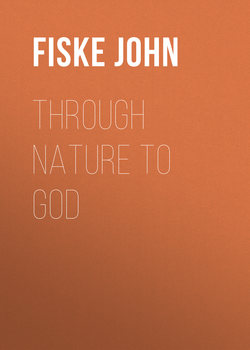Читать книгу Through Nature to God - Fiske John - Страница 9
THE MYSTERY OF EVIL
VI
Without the Element of Antagonism there could be no Consciousness, and therefore no World
ОглавлениеWe may now come up out of these depths, accessible only to the plummet of psychologic analysis, and move with somewhat freer gait in the region of common and familiar experiences. It is an undeniable fact that we cannot know anything whatever except as contrasted with something else. The contrast may be bold and sharp, or it may dwindle into a slight discrimination, but it must be there. If the figures on your canvas are indistinguishable from the background, there is surely no picture to be seen. Some element of unlikeness, some germ of antagonism, some chance for discrimination, is essential to every act of knowing. I might have illustrated this point concretely without all the foregoing explanation, but I have aimed at paying it the respect due to its vast importance. I have wished to show how the fact that we cannot know anything whatever except as contrasted with something else is a fact that is deeply rooted in the innermost structure of the human mind. It is not a superficial but a fundamental truth, that if there were no colour but red it would be exactly the same thing as if there were no colour at all. In a world of unqualified redness, our state of mind with regard to colour would be precisely like our state of mind in the present world with regard to the pressure of the atmosphere if we were always to stay in one place. We are always bearing up against the burden of this deep aerial ocean, nearly fifteen pounds upon every square inch of our bodies; but until we can get a chance to discriminate, as by climbing a mountain, we are quite unconscious of this heavy pressure. In the same way, if we knew but one colour we should know no colour. If our ears were to be filled with one monotonous roar of Niagara, unbroken by alien sounds, the effect upon consciousness would be absolute silence. If our palates had never come in contact with any tasteful thing save sugar, we should know no more of sweetness than of bitterness. If we had never felt physical pain, we could not recognize physical pleasure. For want of the contrasted background its pleasurableness would be non-existent. And in just the same way it follows that without knowing that which is morally evil we could not possibly recognize that which is morally good. Of these antagonist correlatives, the one is unthinkable in the absence of the other. In a sinless and painless world, human conduct might possess more outward marks of perfection than any saint ever dreamed of; but the moral element would be lacking; the goodness would have no more significance in our conscious life than that load of atmosphere which we are always carrying about with us.
We are thus brought to a striking conclusion, the essential soundness of which cannot be gainsaid. In a happy world there must be sorrow and pain, and in a moral world the knowledge of evil is indispensable. The stern necessity for this has been proved to inhere in the innermost constitution of the human soul. It is part and parcel of the universe. To him who is disposed to cavil at the world which God has in such wise created, we may fairly put the question whether the prospect of escape from its ills would ever induce him to put off this human consciousness, and accept in exchange some form of existence unknown and inconceivable! The alternative is clear: on the one hand a world with sin and suffering, on the other hand an unthinkable world in which conscious life does not involve contrast.
The profound truth of Aristotle's remark is thus more forcibly than ever brought home to us. We do not find that evil has been interpolated into the universe from without; we find that, on the contrary, it is an indispensable part of the dramatic whole. God is the creator of evil, and from the eternal scheme of things diabolism is forever excluded. Ormuzd and Ahriman have had their day and perished, along with the doctrine of special creations and other fancies of the untutored human mind. From our present standpoint we may fairly ask, What would have been the worth of that primitive innocence portrayed in the myth of the garden of Eden, had it ever been realized in the life of men? What would have been the moral value or significance of a race of human beings ignorant of sin, and doing beneficent acts with no more consciousness or volition than the deftly contrived machine that picks up raw material at one end, and turns out some finished product at the other? Clearly, for strong and resolute men and women an Eden would be but a fool's paradise. How could anything fit to be called character have ever been produced there? But for tasting the forbidden fruit, in what respect could man have become a being of higher order than the beasts of the field? An interesting question is this, for it leads us to consider the genesis of the idea of moral evil in man.
